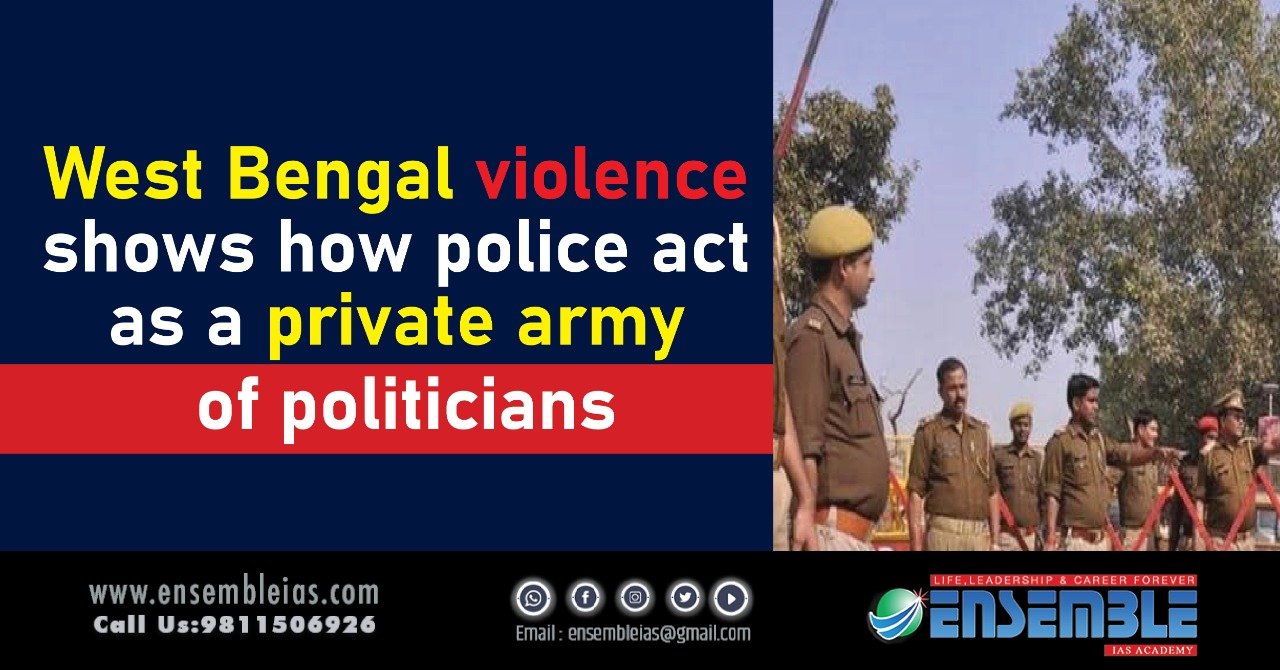West Bengal violence shows how police act as a private army of politicians:
To say that the Election Commission was in charge of the police during polls in West Bengal is only an alibi. The law doesn’t stop functioning during elections.
To buy our online courses: Click Here
West Bengal last week saw a number of incidents of post-poll violence — a Union minister’s vehicle attacked; some local political leaders injured; properties damaged; women beaten up and thousands forced to leave their homes, with many even going to Assam. The violence is continuing and revenge politics seems to be the main cause. The appeasement or aggression towards the minority community has also played its part. The goonda elements in the state are emboldened with no fear of law because they are assured of political and police protection. The police and its political masters have abdicated their responsibility in enforcing the law and the Constitution. In a free democratic country, the hapless citizen has nowhere to go. They can flee but for how long should they stay displaced? There can’t be a worse indictment of any State.
The police inaction
The question arises as to why no preventive or punitive measures, as prescribed by the law, have been taken so far? What were/are the District Magistrates, Superintendents of Police and Police Commissioners of the violence-hit areas doing? To say that the Election Commission was in charge of the police during the polls is only an alibi. The law doesn’t stop functioning during elections. The explanation for inaction is simple. These officials, down to the SHO level, don’t want to serve the common public but work as per the wish of their political masters.
Such officials need to be punished. But who will bell the cat? The political executive in the state, of which the police has become a private army with honourable exceptions, will not punish but reward it for toing its line. That leaves the matters into the hands of the central government and the courts. Police being a state subject, the central government, at best, has control only over IAS and IPS officers, not the lower-ranking officials. The central government should set an example by initiating action against those not performing their duty.
Further, the Calcutta High Court should take suo moto cognizance of the violence and order a CBI inquiry into the role of all concerned police and other officials in the administration for dereliction of duty. These cases should be monitored by the high court itself and exemplary punishments given to the defaulters.
There is going to be a serious fallout of the Bengal violence, and it may become a threat to national security — the increasing communalism. With the minority population dominating several constituencies, political pandering and opposition can only increase tensions in an altered political scenario. A lot of vigil and proactive work is required by all stakeholders to maintain communal harmony.
The second serious fallout is with the appeasement policy in West Bengal. This, coupled with unchecked migration of Bangladeshis, can make matters worse. The state has become a hub of illegal activities — smuggling of cattle and other items.
Police-politician nexus: An all-India problem
Let it also be added that the total political control of the police by political masters is not peculiar to West Bengal but extends to all states in varying degrees, and all political parties have to be equally blamed for it. However, West Bengal today seems to be heading the chart.
The police in India have become worse than its colonial avatar — all the cries of even the Supreme Court on police reforms have been thrown by the political class into the dustbin. The politicians control the police not only legally but administratively too through various local orders that impact recruitment, postings, transfers, punishments, rewards, among others.
First, the pending police reforms, as ordered by the Supreme Court in 2006, should immediately be implemented. The political control of the police should be removed and the forces should remain answerable only to the law and Parliament. Unless this is done, our dream of attaining fast economic prosperity and a healthy democracy is not likely to be achieved anytime soon.
Second, there is a case to look into the recruitment process and training of IAS/IPS officers by the Centre because it is these officers who provide the leadership when policing/administrative standards dip.
Third, India needs electoral reforms that forbid the entry of criminals in Parliament and state legislatures. Today, politicians with criminal records are present in large numbers in Parliament. If there is no check in another two elections, their numbers will only go up. Then we will have to forget about the police reforms forever because the politicians will never leave control of the former. Once convicted by any court for any offence, politicians should be debarred from contesting elections for life. That seems to be the only solution. For the sake of India’s future, the Supreme Court should pass such orders without delay.
(West Bengal violence shows how police act as a private army of politicians:)




